(!)Due to Microsoft's end of support for Internet Explorer 11 on 15/06/2022, this site does not support the recommended environment.
68.800 Stock items for Same Day Shipping
68.800 Item Stok untuk Pengiriman di Hari yang Sama
Search by Category / Brand
Pencarian dengan
Kategori / Merek
Search by Category Pencarian dengan Kategori
- Automation Components
A wide variety of standard and configurable components for factory automation engineers in industries such as automotive, semiconductor, packaging, medical and many more.
- Linear Motion
- Rotary Motion
- Connecting Parts
- Rotary Power Transmission
- Motors
- Conveyors & Material Handling
- Locating, Positioning, Jigs & Fixtures
- Inspection
- Sensors, Switches
- Pneumatics, Hydraulics
- Vacuum Components
- Hydraulic Equipment
- Discharging / Painting Devices
- Pipe, Tubes, Hoses & Fittings
- Modules, Units
- Heaters, Temperature Control
- Framing & Support
- Casters, Leveling Mounts, Posts
- Doors, Cabinet Hardware
- Springs, Shock Absorbers
- Adjusting, Fastening, Magnets
- Antivibration, Soundproofing Materials, Safety Products
- Fasteners
A good selection of accessories such as screws, bolts, washers and nuts that you may need for your daily engineering usage.
- Materials
Browse industrial materials ranging from heat insulating plates, sponges, to metal and plastic materials in different sizes to meet your various applications.
- Wiring Components
A wide variety of wiring parts for connecting and protecting control and PC parts including Connectors, Cables, Electric Wires, Crimping Terminals and more.
- LAN Cables / Industrial Network Cables
- Cables by Application
- Cables with Connectors
- RS232 / Personal Computers / AV Cables
- Wires/Cables
- Connectors (General Purpose)
- Crimp Terminals
- Zip Ties
- Cable Glands
- Cable Bushings/Clips/Stickers
- Screws/Spacers
- Cable Accessories
- Tubes
- Protection Tubes
- Ducts/Wiremolds
- General Purpose Tools
- Dedicated Tools
- Soldering Supplies
- Electrical & Controls
A wide variety of controls and PC parts for electrical engineers including Controls, Powers, PC parts and more.
- Cutting Tools
A wide variety of cutting tools for many uses and work materials including End Mills, Drills, Cutters, Reamers, Turning Tools and more.
- Carbide End Mills
- HSS End Mills
- Milling Cutter Inserts/Holders
- Customized Straight Blade End Mills
- Dedicated Cutters
- Turning Tools
- Drill Bits
- Screw-Hole-Related Tools
- Reamers
- Chamfering / Centering Tools
- Fixtures Related to Cutting Tools
- Step Drills
- Hole Saws
- Clean Key Cutters
- Core Drills (Tip Tools)
- Magnetic Drilling Machine Cutters
- Drill Bits for Electric Drilling Machines
- Woodworking Drill Cutters
- Drills for Concrete
- Processing Tools
A wide variety of tools and supplies used in processing including Machine Tools, Measurement Tools, Grinding and Polishing Supplies and more.
- Material Handling & Storage
A wide variety of goods used in shipment, material handling and warehouse including Tape supplies, Stretch film, Truck, Shelf, Crane and more.
- Tape Supplies
- Cushioning Materials
- Stretch Films
- Cardboard
- Plastic Bags
- PP Bands
- Magic Tapes / Tying Belts
- Rubber Bands
- Strings/Ropes
- Cable Ties
- Tags
- Labelers
- Unpacking Cutters
- Packing Support Equipment
- Cloth Sheets for Packing
- Conveyance/Dolly Carts
- Tool Wagons
- Tool Cabinets / Container Racks
- Lifters / Hand Pallets
- Container Pallets
- Storage Supplies
- Shelves/Racks
- Work Benches
- Suspended Clamps/Suspended Belts
- Jack Winches
- Chain Block Cranes
- Bottles/Containers
- Bicycle Storage Area
- Safety & General Supplies
A large variety of goods for every kind of factories and offices including Protection items, Cleaning supplies, sanitations, office supplies and more.
- Lab & Clean Room Supplies
A large variety of items used in R&D and Clean Room including research Equipment, Laboratory Essentials, Analysis Supplies, Clean Environment-Related Equipment and more.
- Press Die Components
Choose from thousands of standard stamping die components including Punch & Die, Gas Springs, Guide Components, Coil Springs and many more.
- Plastic Mold Components
Browse our wide variety of mold components including Ejector Pins, Sleeves, Leader Components, Sprue Bushings and many more.
- Ejector Pins
- Sleeves, Center Pins
- Core Pins
- Sprue bushings, Gates, and other components
- Date Mark Inserts, Recycle Mark Inserts, Pins with Gas Vent
- Undercut, Plates
- Leader Components, Components for Ejector Space
- Mold Opening Controllers
- Cooling or Heating Components
- Accessories, Others
- Components of Large Mold, Die Casting
- Injection Molding Components
Browse our injection molding components including Heating Items, Couplers, Hoses and more.
- Injection Molding Machine Products
- Accessories of Equipment
- Auxiliary Equipment
- Air Nippers
- Air Cylinders
- Air Chuck for Runner
- Chuck Board Components
- Frames
- Suction Components
- Parallel Air Chuck
- Special Air Chuck
- Chemical for Injection Molding
- Mold Maintenance
- Heating Items
- Heat Insulation Sheets
- Couplers, Plugs, One-touch Joints
- Tubes, Hoses, Peripheral Components
- Komponen Mekanis
- Linear Motion
- Rotary Motion
- Connecting Parts
- Rotary Power Transmission
- Motors
- Conveyors & Material Handling
- Locating, Positioning, Jigs & Fixtures
- Inspection
- Sensors, Switches
- Pneumatics, Hydraulics
- Vacuum Components
- Hydraulic Equipment
- Discharging / Painting Devices
- Pipe, Tubes, Hoses & Fittings
- Modules, Units
- Heaters, Temperature Control
- Framing & Support
- Casters, Leveling Mounts, Posts
- Doors, Cabinet Hardware
- Springs, Shock Absorbers
- Adjusting, Fastening, Magnets
- Antivibration, Soundproofing Materials, Safety Products
- Sekrup, Baut, Washer, Nut
- Material
- Komponen Kabel
- LAN Cables / Industrial Network Cables
- Cables by Application
- Cables with Connectors
- RS232 / Personal Computers / AV Cables
- Wires/Cables
- Connectors (General Purpose)
- Crimp Terminals
- Zip Ties
- Cable Glands
- Cable Bushings/Clips/Stickers
- Screws/Spacers
- Cable Accessories
- Tubes
- Protection Tubes
- Ducts/Wiremolds
- General Purpose Tools
- Dedicated Tools
- Soldering Supplies
- Elektrikal & Kontrol
- Peralatan Pemotong
- Carbide End Mills
- HSS End Mills
- Milling Cutter Inserts/Holders
- Customized Straight Blade End Mills
- Dedicated Cutters
- Turning Tools
- Drill Bits
- Screw-Hole-Related Tools
- Reamers
- Chamfering / Centering Tools
- Fixtures Related to Cutting Tools
- Step Drills
- Hole Saws
- Clean Key Cutters
- Core Drills (Tip Tools)
- Magnetic Drilling Machine Cutters
- Drill Bits for Electric Drilling Machines
- Woodworking Drill Cutters
- Drills for Concrete
- Peralatan Produksi
- Penanganan Material & Penyimpanan
- Tape Supplies
- Cushioning Materials
- Stretch Films
- Cardboard
- Plastic Bags
- PP Bands
- Magic Tapes / Tying Belts
- Rubber Bands
- Strings/Ropes
- Cable Ties
- Tags
- Labelers
- Unpacking Cutters
- Packing Support Equipment
- Cloth Sheets for Packing
- Conveyance/Dolly Carts
- Tool Wagons
- Tool Cabinets / Container Racks
- Lifters / Hand Pallets
- Container Pallets
- Storage Supplies
- Shelves/Racks
- Work Benches
- Suspended Clamps/Suspended Belts
- Jack Winches
- Chain Block Cranes
- Bottles/Containers
- Bicycle Storage Area
- Perlengkapan Keamanan & Umum
- Perlengkapan Sanitasi & Lab
- Komponen Press Die
- Komponen Plastik Mold
- Ejector Pins
- Sleeves, Center Pins
- Core Pins
- Sprue bushings, Gates, and other components
- Date Mark Inserts, Recycle Mark Inserts, Pins with Gas Vent
- Undercut, Plates
- Leader Components, Components for Ejector Space
- Mold Opening Controllers
- Cooling or Heating Components
- Accessories, Others
- Components of Large Mold, Die Casting
- Komponen Injeksi Moulding
- Injection Molding Machine Products
- Accessories of Equipment
- Auxiliary Equipment
- Air Nippers
- Air Cylinders
- Air Chuck for Runner
- Chuck Board Components
- Frames
- Suction Components
- Parallel Air Chuck
- Special Air Chuck
- Chemical for Injection Molding
- Mold Maintenance
- Heating Items
- Heat Insulation Sheets
- Couplers, Plugs, One-touch Joints
- Tubes, Hoses, Peripheral Components
Search by Brand Pencarian dengan Merek
This translation is a Google translation Terjemahan ini adalah terjemahan Google
- Penghentian penjualan kategori produk pneumatik Seri Ekonomi (E-series). Info Detail
Notice of End of Sales for Economy Series Pneumatic Equipment Category. More information.
Idlers HTD 5M (Part Numbers)

- Volume Discount
Idlers HTD 5M
Idlers for timing pulleys are an economy item, The price is cheaper than the MISUMI standard product.They offer a wide variety of sizes to choose from.
[Feature]
● Belt Width Used (mm.) : 9, and 15
● Applicable with Belt Type : 5M
● Number of Teeth : 20, 25, 26, 30, and 32
● Shaft Bore Diameter (mm.) : 8 ,10 , and 12
● Bearing Position : Central Bearing (Single/Double) and Both Sides Bearing
● Material :
Body and Flange : Aluminum Alloy
Bearing : Steel
● Surface treatment : Clear Anodized
[Application]
Idlers for timing pulleys are used to maintain proper tension and alignment in timing belt systems
Part Number
Configured Part Number is shown.
Economy HTD 5M Idler Pulley
- Affordable aluminum construction
- Available in multiple teeth counts.
- Compatible with 5M belt type
- Central or both sides bearing options
- Clear anodized surface for durability


![]()
MISUMI Standard
![]()
Cheaper Price
![]()
Product Variety
![]()
3D CAD Support
Product of Timing Pulley Overview
Product of Timing Pulley Features
・MISUMI Economy series idlers tooth profiles conform to JIS and ISO standards, matching with the standard belt tooth profile for smoother rotation.
| 5M Tooth Profile | MISUMI Economy series (Good engagement) | Products circulating on the market * |
| Engagement of Timing Pulley and Timing Belt | 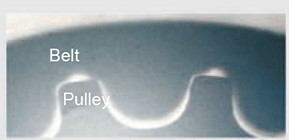 | 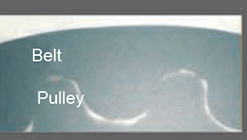 |
| Clearance | Small | Large |
| Positioning Accuracy | Height | Low |
■Rotation Stability of MISUMI Economy series Idlers
| ・MISUMI economy series idler uses MISUMI Economy series bearing with stabler quality and lower noise | 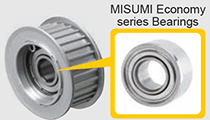 |
| Diameter of Pulley Tooth Top Circle d0 | 5.96≤d0≤203.20 |
| Runout Tolerance (Circumferential Runout) | ≤0.13 |
Dimensional of Timing Pulley Drawing
| ●Central Bearing | ●Both Sides Bearing | |
| <Single Bearing> | <Double Bearing> | |
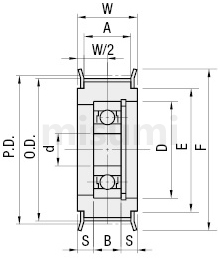 | 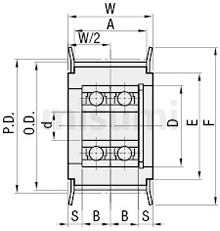 | 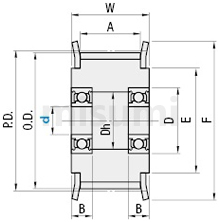 |
 Bearing is pressed fit.
Bearing is pressed fit. Bearing accuracy JIS B1514 Class 0 (Before press-fitting)
Bearing accuracy JIS B1514 Class 0 (Before press-fitting)Specifications of Timing Pulley Overview
 Timing Pulley Material Timing Pulley Material |  Surface Treatment Surface Treatment | ||
| Body | Flange | Bearing | |
| Aluminum Alloy | Aluminum Alloy | Steel | Clear Anodized |
Usage of Timing Pulley Method
| Usage Method Example of Timing Pulley Drawing | Instructions for Use of Timing Belt Idlers and Timing Belt |
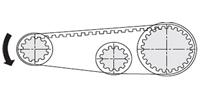 | ①Timing Pulley Belt tensioning Adjust the tension on the inside of the timing belt via the timing belt idler. |
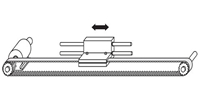 | ②Timing Pulley Linear driving Reciprocating motion is carried out through the self-end timing toothed belt. |
| Usage Method Example Drawing | Instructions for Use of Timing Belt Idlers and Timing Belt |
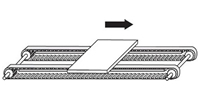 | ③Timing Pulley Conveyance Plates are conveyed by two timing toothed belts |
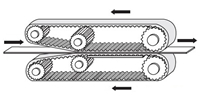 | ④Timing Pulley Traction transmission Workpieces are clamped and transmitted by the belt |
 HTD timing belt idlers, suitable for MISUMI Economy series HTD Timing Belts.
HTD timing belt idlers, suitable for MISUMI Economy series HTD Timing Belts.Example of Timing Pulley Use
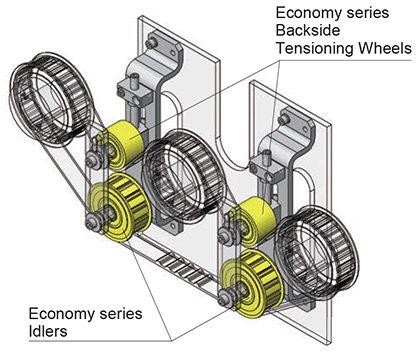
Belt tension device (manual)
■Mechanism function
1. Move the roller on the adjustment side, and tighten and fix it when the conveyor belt opens.
2. For multiple driving applications, the engagement rate can be improved by setting the roller in the middle position.
■ Role of the timing belt idler
1. The belt is tensioned by fixing the belt assembly distance with the timing belt idler
and with the assistance of the urethane roller.
For more information, please click Example for Belt Tension Device.
Related of Timing Pulley Industries
| Semiconductor | Automotive | Smart phone | ||
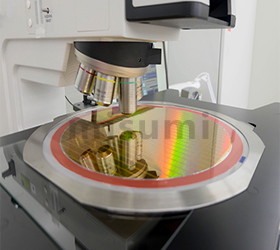 | 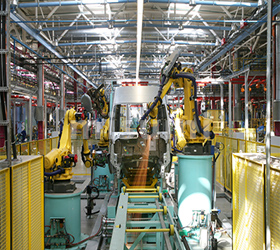 | 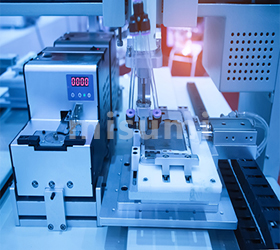 | ||
| Timing Pulley Medical | Electronic & Electrical Appliances | Robotics | ||
 | 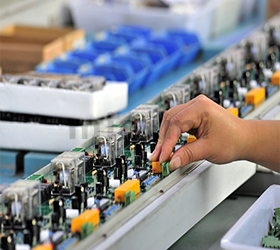 | 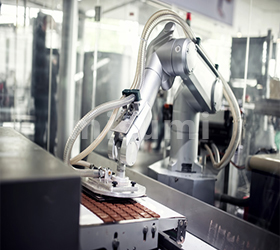 |
Timing Pulley Precautions
Please click on
 Anti-rust performance and maintenance of metal materials and surface treatment.
Anti-rust performance and maintenance of metal materials and surface treatment.Related of Timing Pulley Documents
①Data on the selection of timing pulleys and timing toothed belts, tensioning force, etc. (drive).
②Data on the selection of timing pulleys and timing toothed belts, tensioning force, etc. (transmission & conveyance).
③Main causes and countermeasures for the damage, breakage, abnormal noise of timing toothed belts.
④Reference data on the replacement time of timing toothed belts.
⑤Data on dimensional tolerance of timing pulleys and timing idlers.
Related of Timing Pulley Products
| Flat-belt idlers, Width (T), 6 to 32 mm | Timing Belts H3M | Timing Belts H5M | ||
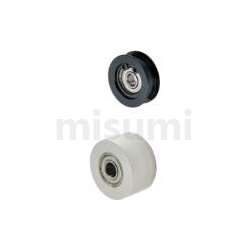 | 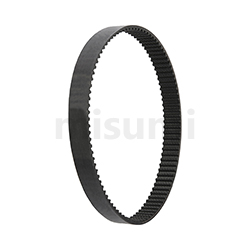 | 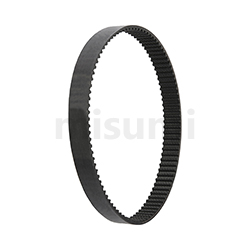 | ||
| Typical Timing Pulley model: HBG15-6 | Typical Timing Pulley model: C-HTBN105H3M-60 | Typical Timing Pulley model: C-HTBN200H5M-90 | ||
| Advantages: short delivery time, multiple types | Advantages: short delivery time, multiple types | Advantages: short delivery time, multiple types |
Part Number
CAD Data download and 3D preview are not available because the part number has not yet been determined.
- *In order to open the CAD Data download and 3D preview screen, the part number must be fixed.
- Please confirm the part number from "Specification / Dimension"on the left side, and then perform the CAD Data Download / 3D Preview operation.
| Part Number |
|---|
| C-AHTF20H5M090 |
| C-AHTF20H5M150 |
| C-AHTF25H5M090 |
| C-AHTF25H5M150 |
| C-AHTF30H5M090 |
| C-AHTF30H5M150 |
| C-AHTFW20-H5M150-8 |
| C-AHTFW26-H5M150-10 |
| C-AHTFW32-H5M150-12 |
| Part Number | Standard Unit Price | Minimum order quantity | Volume Discount | Days to Ship | Belt Width Used (mm) | No. of Teeth (T) | Shaft Bore Dia. d (mm) | Bearing Position | Shaft Bore Dia. D (mm) |
|---|---|---|---|---|---|---|---|---|---|
182,428 IDR | 2 Piece(s) | Available | 14 Day(s) | 9 | 20 | 8 | Center Bearing | 8 | |
205,029 IDR | 2 Piece(s) | Available | 14 Day(s) | 15 | 20 | 8 | Center Bearing | 8 | |
228,529 IDR | 2 Piece(s) | Available | 10 Day(s) | 9 | 25 | 10 | Center Bearing | 10 | |
279,397 IDR | 2 Piece(s) | Available | 14 Day(s) | 15 | 25 | 10 | Center Bearing | 10 | |
222,085 IDR | 2 Piece(s) | Available | 10 Day(s) | 9 | 30 | 12 | Center Bearing | 12 | |
238,511 IDR | 2 Piece(s) | Available | 14 Day(s) | 15 | 30 | 12 | Center Bearing | 12 | |
207,607 IDR | 2 Piece(s) | Available | 14 Day(s) | 15 | 20 | 8 | Both Sides Bearing | 8 | |
260,153 IDR | 2 Piece(s) | Available | 10 Day(s) | 15 | 26 | 10 | Both Sides Bearing | 10 | |
347,051 IDR | 2 Piece(s) | Available | 14 Day(s) | 15 | 32 | 12 | Both Sides Bearing | 12 |
Loading...
| ●Central Bearing | ●Both Sides Bearing | |
| <Single Bearing> | <Double Bearing> | |
 |  |  |
 Bearing is pressed fit.
Bearing is pressed fit.  Bearing accuracy JIS B1514 Class 0 (Before press-fitting)
Bearing accuracy JIS B1514 Class 0 (Before press-fitting) Material Material |  Surface Treatment Surface Treatment | ||
| Body | Flange | Bearing | |
| Aluminum Alloy | Aluminum Alloy | Steel | Clear Anodized |
■Dimension Specification Table 5M (Central Bearing)
| Part Number | Shaft Dia. | P.D. | O.D. | F | E | A | W | S | Bearing size | |||
| Number of Teeth | Applicable Belt | d | No. | D | B | |||||||
| 20 | H5M090 | 8 | 31.83 | 30.87 | 36 | 24 | 11 | 16 | 5 | 698ZZ×1 | 19 | 6 |
| 20 | H5M150 | 8 | 31.83 | 30.87 | 36 | 24 | 17 | 22 | 5 | 698ZZ×2 | 19 | 6 |
| 25 | H5M090 | 10 | 39.79 | 38.83 | 45 | 30 | 11 | 16 | 4 | 6000ZZ×1 | 26 | 8 |
| 25 | H5M150 | 10 | 39.79 | 38.83 | 45 | 30 | 17 | 22 | 3 | 6000ZZ×2 | 26 | 8 |
| 30 | H5M090 | 12 | 47.75 | 46.79 | 52 | 36 | 11 | 16 | 3 | 6201ZZ×1 | 32 | 10 |
| 30 | H5M150 | 12 | 47.75 | 46.79 | 52 | 36 | 17 | 22 | 6 | 6201ZZ×1 | 32 | 10 |
■Dimension Specification Table 5M (Both Sides Bearing)
| Part Number | Shaft Dia. | P.D. | O.D. | F | E | A | W | Dh | Bearing size | |||
| Number of Teeth | Applicable Belt | d | No. | D | B | |||||||
| 20 | H5M150 | 8 | 31.83 | 30.87 | 36 | 24 | 17 | 22 | 16.5 | 698ZZ×2 | 19 | 6 |
| 26 | H5M150 | 10 | 41.38 | 40.42 | 48 | 35 | 17 | 22 | 25 | 6200ZZ×2 | 30 | 9 |
| 32 | H5M150 | 12 | 50.93 | 49.97 | 55 | 40 | 17 | 22 | 25 | 6001ZZ×2 | 28 | 8 |
 MISUMI makes no commitment to the bearing brand
MISUMI makes no commitment to the bearing brandBasic Information
| Type | Idlers with Teeth | Belt Type | 5M | Material | Extra Super Duralumin Series Aluminum Alloy |
|---|---|---|---|---|---|
| Surface Treatment | Clear Anodize | Timing Pulley / Idler | Idlers |
Specification/Dimensions
-
Belt Width Used(mm)
-
No. of Teeth(T)
-
Shaft Bore Dia. d(mm)
-
Bearing Position
- Both Sides Bearing
- Center Bearing
-
Shaft Bore Dia. D(mm)
-
type
- C-AHTFW□□-H5M
- C-AHTF□□H5M
-
CAD
- 2D
- 3D
Days to Ship
-
- All
- 10 Day(s) or Less
- 14 Day(s) or Less
Specify Alterations
- The specifications and dimensions of some parts may not be fully covered. For exact details, refer to manufacturer catalogs .
Frequently asked question (FAQ)
- Question: Why does the flange drop during the use of a timing belt idler?
- Answer: The function of the flange is to prevent production accidents caused by deviation and drop of the timing belt. Therefore, the flange drops mainly because it is squeezed off by the timing belt that has deviated for a long time. We recommend that the customer regularly check the condition of the timing belt of the equipment to avoid its deviation.
- Question: Is it possible that no flange is attached to the timing belt idler product?
- Answer: Yes. Generally, the timing belt idler is shipped with flange attached. If the customer selects NFC (flange not attached) and RFC·LFC (flange attached on one side only) of MISUMI alteration specifications, no flange will be attached.
- Question: Why is the color of MISUMI's clear anodized timing belt idler similar with the hard anodized one?
- Answer: As the clear anodized and hard anodized coating of MISUMI's timing belt idler is relatively thin (about 2 microns), it is difficult to distinguish the color.
- Question: What is the idler?
- Answer: It mainly plays the role of tension adjustment and auxiliary transmission of the timing belt.
- Question: What does the number in the timing belt idlers S2M, S3M, P2M, P3M, T5, T10, 2GT, 3GT, etc. mean?
- Answer: It mainly represents the tooth pitch of the belt, that is, the distance between two adjacent teeth. They are also the tooth profile models in the timing belt industry.


How can we improve?Bagaimana Kami bisa meningkatkan Pelayanan?
How can we improve?Bagaimana Kami bisa meningkatkan Pelayanan?
While we are not able to respond directly to comments submitted in this form, the information will be reviewed for future improvement.
Customer Privacy Policy Walaupun Kami tidak dapat langsung menjawab saran yang ditulis di lembar ini, informasinya akan kami review untuk peningkatan pelayanan dikemudian hari
Kebijakan Privacy
Thank you for your cooperation.Terima kasih atas kerjasama anda.
While we are not able to respond directly to comments submitted in this form, the information will be reviewed for future improvement.
Please use the inquiry form.
Customer Privacy Policy Walaupun Kami tidak dapat langsung menjawab saran yang ditulis di lembar ini, informasinya akan kami review untuk peningkatan pelayanan dikemudian hari
Silahkan pergunakan Forms Permintaan.
Kebijakan Privacy